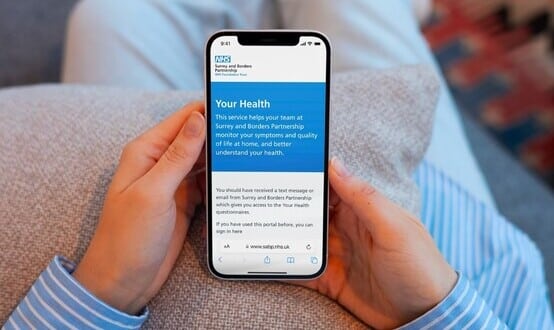EHI Awards 2014: Rising star
- 8 December 2014

“I didn’t originally start out with a big plan of going into healthcare informatics,” admits Dave Newton, the winner of the ‘rising star’ category of the EHI Awards 2014.
In fact, his initial career plan was to become a clinical psychologist. When health IT came calling, he was working as a researcher at South London and Maudsley NHS Foundation Trust, exploring the concept of recovery in older adults suffering from mental ill health.
“I was speaking at a conference about recovery,” he remembers. “And one of the professors from the Institute of Psychiatry was talking around something called avatar therapy, which they were just starting to pilot.
“A patient would come in and describe the auditory hallucination they were having, and they would use software to model an avatar of the hallucination – so the patient could perceive it in a real way. And then the therapist would act as the voice of the avatar, and they’d do guided therapy to look at desensitising the patient.”
The presentation was to prove a turning point in Newton’s career. “It fascinated me,” he says now. “And it started to draw me in towards this space of informatics and health IT.”
myproject – myhealthlocker
After a conversation with the trust’s chief information officer, and a formal interview, he found himself recruited to work on a new project. The aim: to use access to electronic personal health records to empower service users and clinicians alike.
Web-based tool myhealthlocker now supports hundreds of patients at the trust – the target is to have 1,000 users by the end of this financial year – but when Newton began work on it it’s fair to say it was still in its infancy. Or, more accurately, embryonic.
“When I started, they were just finishing the link so you could send the care plan to the patient and receive a patient reported outcome measure back into the system,” he remembers. “It wasn't quite finished, but it was getting there.”
To look at the system now is to understand what Newton means when he speaks of “an incredible journey these past two years.”
Users can not only view their care plan and submit PROMs, but can also see correspondence relating to their treatment, complete a health journal in which they can monitor their mood and any common medication side effects, use a wellbeing tool to record symptoms, and receive appointment reminders.
If their GP practice is among a pilot group, they can use the system to view their primary care data as well. It is impressive progress, and colleagues credit Newton with spearheading it.
He has written multiple successful funding bids to expand the system, championed it throughout the organisation, and helped recruit clinicians to the myhealthlocker team. The last was particularly important because, despite its success, the project has not been without its challenges.
Overcoming clinical concerns
“At first there was certainly a lot of resistance from clinicians,” Newton reports. “Even though myhealthlocker had been talked about across the trust, people were still very surprised to see it developed. There were the normal fears from clinicians around sharing of ‘their’ notes, and so a lot of hearts and minds work to begin with.”
He adds: “Talking to more and more clinicians, you start to uncover clinical processes. We built the system to share the care plan and so, essentially, had selected the care plan box in the medical record.
“But a lot of teams weren't using that to write care plans – they were writing them in a Word document and uploading them. This began to highlight the real importance of having that close clinical contact around the design and development of things.”
It is why the myhealthlocker team now counts a nurse, occupational therapist and consultant psychiatrist amongst its membership.
Helping patients
Engaging service users hasn’t always been straightforward, either. Mental health patients are often consigned to the ‘difficult to reach’ box, particularly when they experience some of the more serious conditions treated at specialist providers like South London and Maudsley. The myhealthlocker solution: training sessions on digital inclusion.
“We run a lot of teaching and training,” says Newton. “In mental health, there are a lot of difficulties with that. In psychosis, for instance, it is very typical that somebody is not from a great socioeconomic background, and has maybe left education early.
“So every day now we provide an hour or two hour support sessions for people to come and get involved in myhealthlocker. And then they’re given other opportunities to train other people and to look at volunteering opportunities and maybe paid employment.”
It is characteristic of the holistic approach of the project. “I think that’s what our patients want. They said right from the start they didn’t want myhealthlocker to be branded as a Maudsley thing; they wanted it to be focused on health and wellbeing and supporting them to manage their condition.”
Moving onto other services
Newton suggests that wider focus has helped the system to prove equally valuable for other conditions. Myhealthlocker pilots are about to begin in maternity services at University College London Hospitals, and in diabetes at King’s College Hospital.
“I think what we want in the long term is to build a core system, with some basic essentials, and then enable people to build on top of that,” he explains.
These are far from the only plans for the future. Newton speaks of a “personal ambition” to make myhealthlocker part of standard care for patients at South London and Maudsley.
“Being involved in your care is so important that, in the same way as you get a clinical record when you are treated here, you should get a personal health record. You’ll have the ability to interact with us digitally as well as to be involved in your healthcare in quite a meaningful way.”
His ideas for new functionality include virtual consultations, contextualised health advice based on a patient’s data, and peer support. The problem, says Newton, is not a lack of ideas but the danger that the team spreads itself too thin. He is also conscious of the need to prove a clear return on investment.
“While I think we all agree this is good for quality of care and good for services, ultimately there is an economics factor to all of this. I think that is an important factor that every health IT project needs to think around, because every finance director will be heavily concerned about that.
“So for myhealthlocker we need fiscal evidence, we need evidence from clinicians showing it does improve their interaction with patients, and we need research evidence to show that it can change health outcomes.
“One barrier is how you develop effective valuation frameworks for health IT – it takes five years for a randomised control trial, and technology's evolved three times in that time period.”
What next? Who knows?
As for how Newton career might evolve in that time; he’s unsure. “I’ve found it just such a fascinating road where this project has gone – you almost don’t know what’s going to happen next,” he says.
“Beforehand, I thought there was a very much more structured way of doing things. In some aspects of the NHS, they get rooted into a way of working and feel like there’s no way to change. There are invisible walls everywhere, and barriers, and people just assume that you can’t do things.
“And I think what his has opened up to me is that you can do a lot of things, and if you have communication and discussion then some of those walls can come down. And it’s been amazing to see what can be achieved.”




